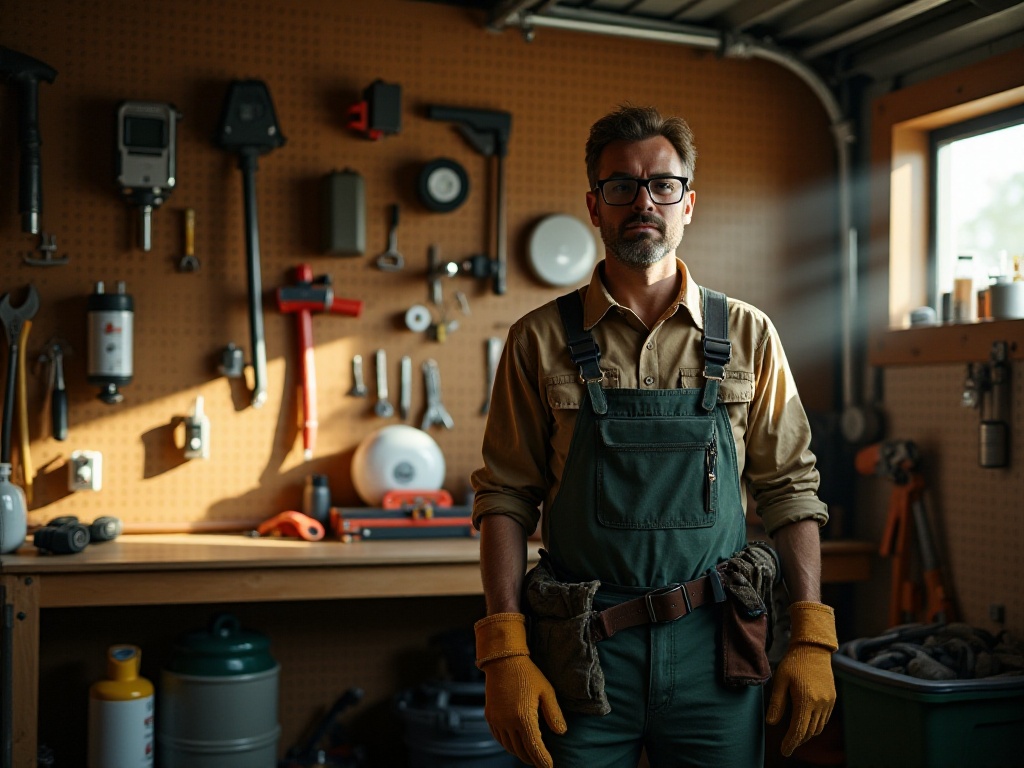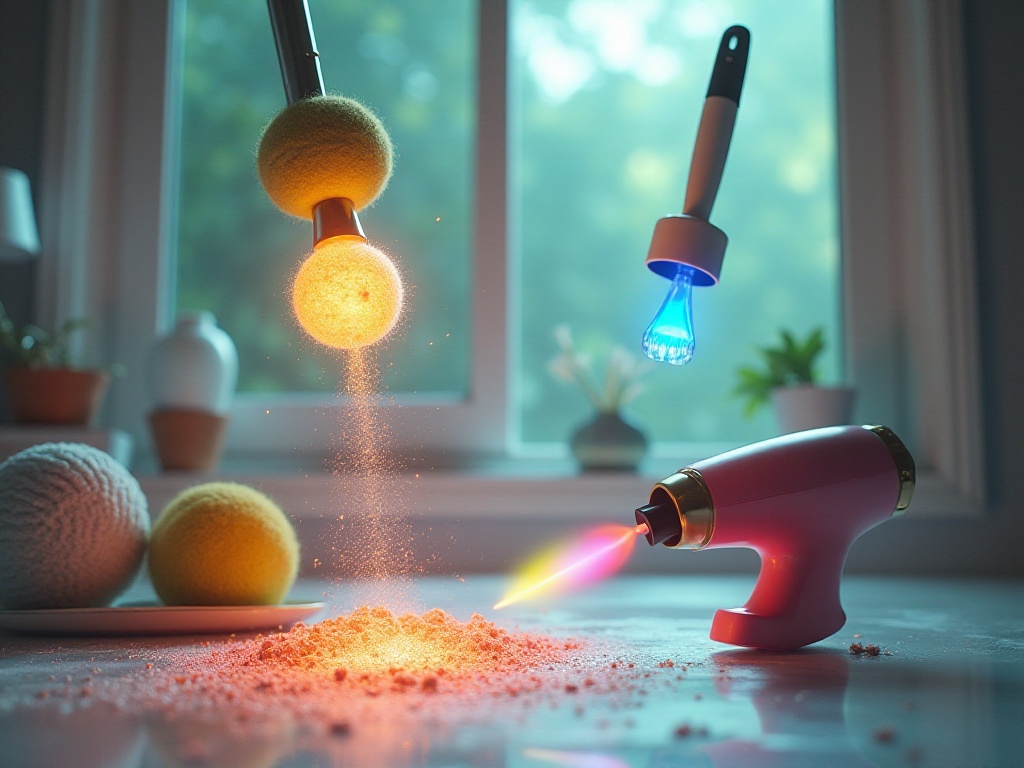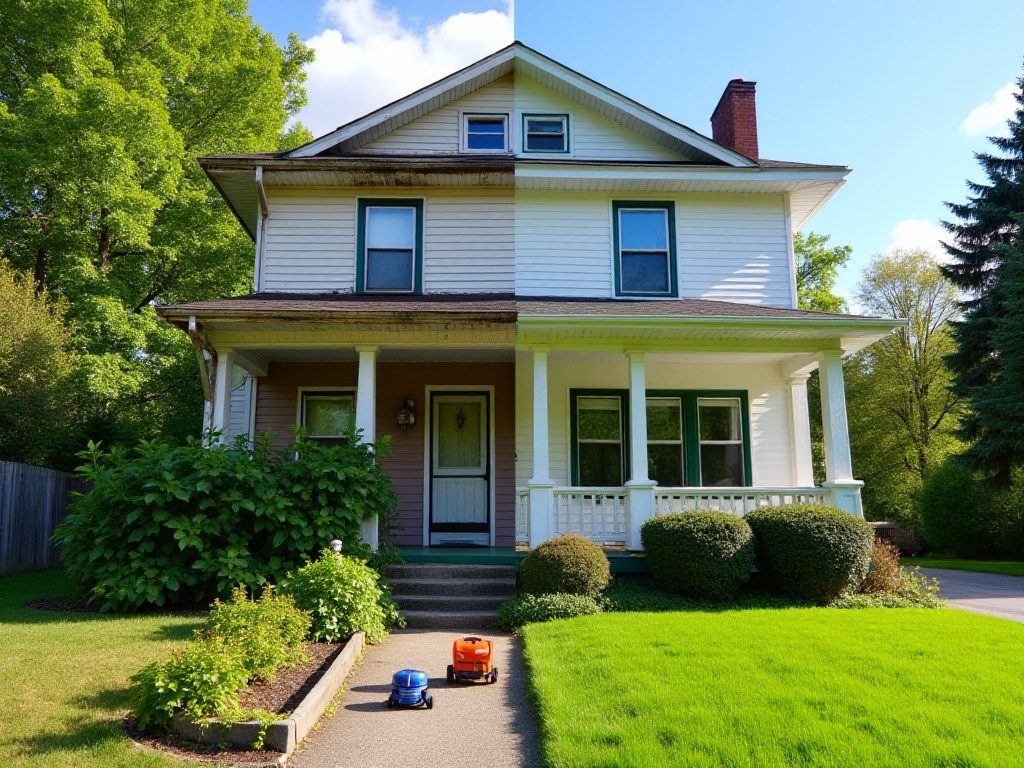Opening Thoughts
As a working person who just moved out, I deeply understand the importance of home maintenance. Every time I visit my parents and see how well my mother keeps the house in order, I'm truly impressed. Now that I live on my own, I realize that taking care of a home requires many skills and patience.
The other day, I specifically consulted an aunt who has been a full-time mom for over 20 years. She generously shared many practical home maintenance secrets. These tips are not only easy to learn but also very cost-effective. Today, I'm organizing and sharing these valuable experiences with everyone, hoping to help more young people like me maintain their homes better.
Safety First
To be honest, when I first started living independently, I had no concept of home safety. It wasn't until I was awakened one night by a neighbor's fire alarm that I realized the importance of safety equipment. Although it turned out to be a false alarm that night, the incident taught me a vivid lesson.
Since then, I've developed a habit of regularly checking home safety equipment. Every first weekend of the month, I do a comprehensive inspection. First is the smoke detector - pressing the test button to ensure it emits a clear alarm. If the sound becomes weak or silent, the battery needs immediate replacement. The same goes for the carbon monoxide detector, which is even more important because carbon monoxide is colorless and odorless, impossible for humans to detect.
Besides these basic equipment, I also check the power outlets in each room. Many young people today like to buy various electronic devices, connecting multiple devices to one outlet. This can easily cause overload and create safety hazards. My advice is to regularly check if there's any heating or yellowing around outlets, and address issues promptly if found.
The security system shouldn't be neglected either. Door locks need regular oiling to prevent rusting and jamming. Window security latches should be kept working smoothly. If you live on the ground floor, it's best to install security screens on windows. These investments might seem significant, but they're worth it for safety.
Another often overlooked safety concern is bathroom slip prevention. I've placed non-slip mats in the bathtub and on the floor, and installed handrails in the shower. These details are particularly useful when bathroom surfaces are wet.
Regarding electrical safety, many young people might not know that water shouldn't be used to extinguish electrical fires. It's best to keep a small dry powder fire extinguisher in an easily accessible place. Familiarize yourself with the instructions in advance so you won't panic when needed.

Seasonal Rotation
Each season has its particular maintenance needs. I've now developed a complete seasonal maintenance plan.
Spring is the best time for deep cleaning. After being closed up all winter, homes often develop some odors. The first thing to do is open all windows for ventilation, letting fresh air circulate. Then check walls for mold, especially in the kitchen and bathroom. If mold is found, it can be wiped with diluted bleach, but ensure good ventilation.
Air conditioners should also be serviced in spring. Cleaning the filters is crucial, as accumulated dust not only affects cooling efficiency but may also breed bacteria. I usually remove the filters, wash them with warm water and detergent, and reinstall them after drying. Clear debris around outdoor units to ensure proper heat dissipation.
Cleaning drain pipes is a top priority for spring maintenance. Leaves and debris can easily cause blockages, which might lead to leaks during heavy rain. Wear gloves when cleaning and use tools to clear accumulated debris. If it's difficult to clean yourself, it's best to call professionals.
Spring is also time for garden maintenance. Trim winter-dead branches, clear weeds, and prepare for the new growing season. If you have a lawn, this is a good time to reseed bare patches.
Summer's focus is on waterproofing and moisture control. Window seals are especially important during the rainy season - check frames for cracks and ensure seals are intact. Fix problems promptly to prevent rain seepage.
Dehumidifiers are essential in summer. I usually place one in rooms with high humidity, especially in closets. If you don't have a dehumidifier, desiccants can be used, but remember to replace them regularly.
Kitchen ventilation needs special attention in summer. Cooking fumes are more likely to stick to walls and furniture in hot weather. I recommend running the range hood while cooking and continuing for 5 minutes after finishing to exhaust remaining fumes.
Fall is crucial for winter preparation. Heating systems should be checked early, including radiator bleeding and cleaning. For floor heating, test run to ensure all circuits work properly.
Door and window seals also need thorough checking in fall. Seals may shrink and deform as weather cools. I check for drafts around windows by hand and address any issues promptly.
Fallen leaves become a significant issue in fall. Regularly clean yards and roofs to prevent leaves from blocking drainage systems. If there are large trees nearby, check more frequently during leaf-falling season.
Winter focuses on freeze prevention. Pipes are most susceptible to freezing, especially outdoor ones. Wrap them with insulation, or let faucets drip slightly during extremely cold weather to prevent pipe bursts.
Heating equipment requires special safety attention. When using space heaters, keep flammable items away and turn them off promptly after use. Humidifiers are essential in winter but need regular cleaning to prevent bacterial growth.

Innovative Thoughts
Regarding innovative home maintenance methods, I've recently learned many practical tips. For example, carpet dents can be fixed with ice cubes instead of paying for professional service. Simply place ice cubes on the dent and let them melt slowly - the carpet fibers will naturally recover. I've tried this method several times with great results.
There's also a trick for patching small wall holes. Makeup sponges (beauty blenders) are perfect for applying putty. Fill the hole with putty, then gently press with a damp beauty blender to ensure perfect adhesion with the wall surface. After it dries, lightly brush with wall paint, and the repair is almost invisible.
There are cost-effective methods for furniture maintenance too. For scratches on wooden furniture, rub with walnut kernels. The natural oils will gradually seep into the wood, making scratches less noticeable. For dark furniture, strong coffee can also work well as a concealer.
I have a special method for leather sofa maintenance. Wipe monthly with warm milk - it not only cleans the surface but keeps the leather soft. After wiping dry with a cloth, apply a layer of professional leather conditioner to maintain the shine.
Glass cleaning has its techniques too. Using newspaper with vinegar water to clean windows not only prevents water marks but is also environmentally friendly. Just mind the vinegar ratio - generally one part vinegar to ten parts water works well.
Electronic appliance maintenance is also crucial. For kettle limescale, white vinegar works instead of specialized descaler. Add appropriate amounts of vinegar and water, boil, let sit, and the limescale will naturally detach.
I've found cola works great for toilet cleaning. Pour in cola, let sit for an hour, then flush. The acidic properties effectively remove limescale. However, use this method moderately as frequent use might affect drainage pipes.

Kitchen Wisdom
The kitchen needs the most frequent maintenance. Range hood cleaning has always been challenging, but I've found a good method: regularly wipe the exterior with a cloth dampened with cooking oil to prevent dust adhesion. Wiping with kitchen paper after each use reduces grease buildup.
Range hood filters need monthly cleaning. I first soak them in hot water with degreasing cleaner, then gently scrub with a soft brush. For stubborn grease, adding baking soda improves effectiveness.
Refrigerator maintenance is also important. First, ensure proper positioning - leave at least 5cm between the refrigerator and wall for better heat dissipation. Clean the condenser every three months using a vacuum cleaner or long-handled brush.
Refrigerator organization matters too. I use transparent containers to categorize ingredients, making things visible and easy to clean. Keep the refrigerator compartment at 2-5 degrees Celsius, and the freezer around -18 degrees.
Stove cleaning is another common headache. My experience is to immediately wipe oil splatters with kitchen paper rather than letting them dry. For dried stains, apply a baking soda paste, let it sit, then wipe clean.
Sink cleaning and deodorizing have tricks too. After the last use each day, rinse thoroughly with clean water and dry with kitchen paper. Regularly pour baking soda down the drain followed by hot vinegar to both clear and deodorize.
Kitchen organization is important too. I keep frequently used seasonings on a turntable for easy access and cleaning. Knives should be stored upright to prevent rusting and for safety.
Cutting board maintenance needs attention. Wipe with salt water after each use for effective sterilization. For wooden boards, occasionally apply cooking oil to prevent cracking.

Closing Thoughts
Through this period of practice, I've deeply realized that home maintenance isn't really difficult. The key is patience and developing good habits. Like tending a small garden, giving it daily attention and care will reward you with a comfortable and cozy living environment.
Though my home isn't large, it's well-organized, and friends always comment on how cozy it feels. This sense of achievement is really wonderful. Actually, the most important aspect of home maintenance isn't how much money you invest, but your heart and persistence. Bit by bit accumulation will ultimately make your home better and better.
I hope these shared experiences can help everyone. Each home is unique, and you'll surely discover many maintenance methods that suit your needs through practice. I look forward to seeing everyone share their insights in the comments, so we can make our homes even better together.




